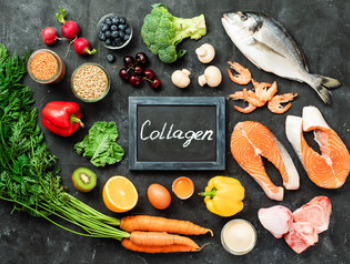Important Facts About Collagen! Health Benefits, Food Sources, Supplements
- 0 Comment(s)
- April 20, 2020
Collagen is a protein and is one of the main building blocks of our skin. It’s also found in our bones, tendons, and ligaments. It is responsible for your skin’s structure, elasticity, texture, strength, and resilience. Collagen makes up 75 percent of the skin’s support structure.
Factors Responsible for the Loss of Collagen in the Skin

Collagen starts to degrade with age, and our genetics can affect how fast that degradation happens. We lose collagen year after year and make lower quality collagen. Free radicals also damage collagen. Environmental factors (like UV rays or pollution), bad lifestyle habits (smoking), and a poor diet (for example one high in sugar) all create a free radical formation, which speeds collagen breakdown. Research suggests that smoking allows free radicals to attack collagen fibrils, rendering them weak and of poor quality. It’s not surprising, therefore, that the skin of a smoker tends to look damaged and wrinkled, particularly around the mouth.
Benefits of Collagen
Collagen plays an important role in our body. Collagen gives body tissue structure, toughness, rigidity, and texture. In the skin, it’s akin to a layer of leather. And when it intermingles with elastic fibers, it gives skin strength and resilience. When it begins to degrade in skin and levels drop in the body, it causes wrinkles, stiffer tendons and ligaments, weaker muscles, joint pain, and even GI problems.
How to Increase Collagen Production

Every year after 30, we lose collagen, and our ability to produce high-quality collagen can diminish. Topicals enhance collagen production to help replenish collagen stores. One is retinoids or retinol, often formulated in anti-aging creams and serums. Retinoic acid and retinol stimulate collagen synthesis in the skin. Also, applying products containing alpha-hydroxy acids, like glycolic acid, and peptides can trigger collagen formation.
There are several treatments, performed in-office at the dermatologist, that help increase collagen. A variety of procedures are able to increase collagen production and improve the appearance of skin. These include lasers, radiofrequency, ultrasound, micro-needling, and fillers. Protein-rich foods will supply the amino acids your body needs to produce collagen. It also gets some help from other nutrients, like vitamin C, zinc, and copper. To maximize collagen production, eat a varied diet filled with whole foods like fruits, vegetables, whole grains, beans, lean meats, seafood, and nuts.
Book an appointment today! Call (361) 576-9100
